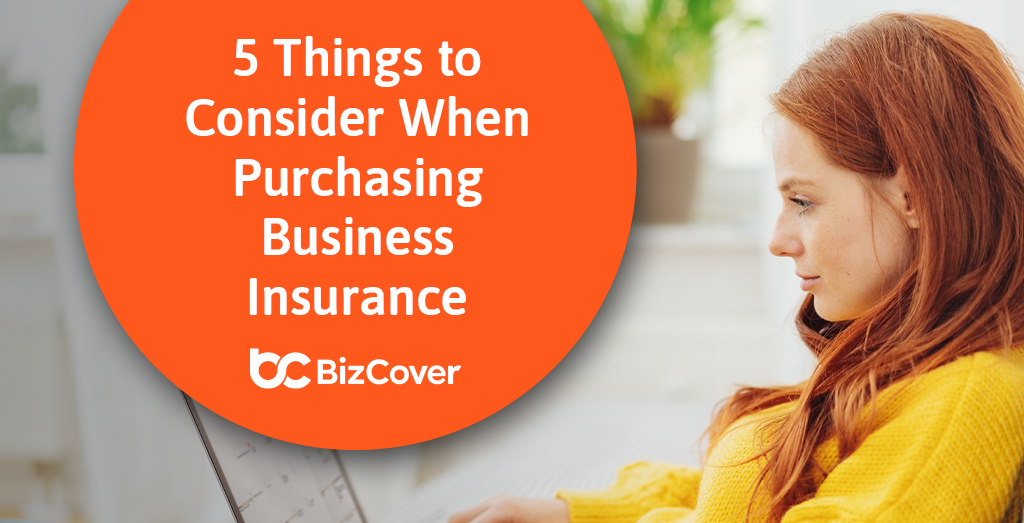5 things to consider when purchasing business insurance
If you find yourself in the market for business insurance but not sure where to start, then you’ve come to the right place. In our guide we go through some of the basics that you need to understand when weighing up the different types of policies, details and the nitty gritty to when shopping around for your business insurance policy.
Whether you’re a newbie just starting up your own business or been in business for some time, we’re here to make arranging your business insurance a breeze.
Let’s start with one of the fundamental questions when trying to work out what kind of business insurance your business needs.
1. What potential risks are my business exposed to?
Take a moment to reflect on the kind of business activities that your business undertakes and consider the following aspects:
- Does your business provide professional services or give specialist advice?
- Where you do you operate your business from? Do you have a physical premises, is your business online, or both?
- How do you interact with your customers? Do they come to you, or do you visit them?
- How many staff do you employ? Do you rely on contractors or suppliers?
- What utilities, equipment, machinery and technology do you need to successfully run your business?
Once you have established an idea of all the things that you rely on to keep your business running, it’s time to take a moment to think through some of the things that could go wrong and that could affect your business operations.
These are some hypothetical scenarios that you need to consider and how it would impact your business:
- If you or a staff member made an accidental mistake or were negligent when providing professional advice or a service?
- If you or your staff were to provide misleading or incorrect advice?
- A customer, supplier or member of the public was injured as a result of your business activities?
- You or your staff member were to accidentally damage somebody’s property while undertaking your business activities?
- What would you do if your business premises suffered a natural disaster or fire?
- You experienced damage or theft of your contents, equipment or stock?
- The machinery you rely on broke down?
- Your website was hacked or your customer data was stolen?
- You were unable to work due to an accident or illness?
2. What type of business insurances do I need to consider?
When you have a solid understanding of the types of risks and scenario’s that pose a threat to the livelihood of your business, it makes it easier to know what kind of business insurance policies are going to provide the protection your business needs.
Not only is there the risk-protection side of things, but for some professions, business insurance may be a legislative requirement, especially if you belong to an industry body or membership. It may also be a requirement by your landlord if you are renting your business’ premises.
This a quick overview of some of the types of business insurances that are available to protect your business:
Public Liability insurance*: Public Liability insurance is an important type of insurance cover for retail shop owners. Public Liability insurance is designed to help protect you and your business in the event a customer, supplier or a member of the public claims against you for injury or damage to their property as a result of your negligent business activities.
Product Liability insurance*: If appropriate for your business, it may also be important to have Product Liability cover to protect your business against personal injury or property damage claims caused by the products sold or supplied by you. Many Public Liability policies include Product Liability cover.
Professional Indemnity insurance*:Professional Indemnity insurance is designed to help protect you from losses claims against your business as a result of actual or alleged negligent acts or omissions in the provision of your professional service or advice.
Subject to applicable limits, your Professional Indemnity policy, will meet the associated compensation payable to a third party together with your defence costs (which can include legal fees, investigator fees and expert fees)
Business Insurance*:Your customers are important, but so are your business assets. Without the right cover, you could be hit with a few unwanted challenges that could leave you severely out of pocket.
Business Insurance available cover options include:
Contents and stock* – provides cover for loss of or damage to items such as business equipment, stock, plant and machinery, records and furniture belonging to you at the insured premises.
Building* – provides cover for loss and damage to buildings you own, as a result of an insured event (such as fire, storm, wind).
Glass* – a common optional cover for retail businesses is glass insurance, which covers damage to the glass and signage at the insured premises.
Money* – covers you in the event that business money is lost, stolen or damaged whilst in your business premises, in transit, or in your private residence.
Business Interruption* – could your business survive being shut due to an insurable event, for a few days, a week, or longer? Business interruption insurance covers financial loss as a result of an interruption to your business caused by an insured event (such as fire).
Cyber Liability insurance*: Small retail businesses can be an easy target for cyber criminals. Cyber Liability insurance helps to protect you from claims and supports your profitability in the event of a cyber breach or attack.
Management Liability insurance: protects directors and officers and the insured company itself from the many exposures relating to the management of a company. Owners and those responsible for the management of a company have specific responsibilities which can result in personal liability for alleged or actual wrongdoing.
Tax Audit insurance*: covers a business for specified costs in the event that it is selected by the Australian Tax Office for auditing. The policy covers the costs of accountants and other professional fees incurred in the course of an audit.
Personal Accident & Illness insurance*: can provide cover options for loss of income if you are unable to work due to illness or injury; and benefits if you become permanently disabled or pass away as a result of an injury (the covers you select will apply even if the injury or illness occurs outside of your employment).
Related: 7 Types of Insurance Your Small Business Should Consider
3. How much insurance will I need to consider?
There’s no one size fits all solution when it comes to the amount of coverage your business will need, with every business having its own unique business risks. When trying to calculate the level of cover, these are some things to be mindful of:
- If you have legal requirements to hold a business insurance policy, make sure that you have a sufficient level of cover in place. As previously mentioned, this is something which is often required for memberships to certain profession and industry bodies.
- If you work with contracts, check if there are any minimum levels of insurance required.
- Think about the cost which may be involved if a claim were made against you and you had to fight it in court. What kind of compensation would you need to pay your client and how much would you need to cover the associated legal fees?
- Go through your business assets including any property, contents, stock and equipment and add them up. How much would it cost if you had to replace it all? This should help you come to sort of idea when it comes to figuring out the amount of cover you need to insure them for.
4. What are some of the terms I need to consider when selecting a policy?
There are many insurance products available, varying from one insurer to the other. That’s why it is really important to check and understand the terms and conditions of your policy before you purchase it.
To help navigate your way through things like the Product Disclosure Statement, we’ve created quick summary of some of the key terms:*
- Exclusions: is a provision in the insurance policy which describes circumstances, events or items for which the policy will not provide cover. This is outlined in your Product Disclosure Statement (PDS)
- Excess: also referred to as a ‘deductible’, is the amount the insured to be born by the insured prior to the a claim being made. For example, if you were to lodge a claim for $3000 and your excess is $500, the amount you would receive from claim would be $2500 as the excess is deducted from the payout.
- Extension: optional cover for losses that fall outside of the normal conditions of the policy which comes at an additional cost.
- Limits’ or sub-limits: refer to the maximum amount that is payable under a policy for an insured event or item..
5. How to buy business insurance?
Shopping around for business insurance can be a time-consuming process, but luckily there are options there to help make it a little bit easier. Chatting directly with an insurer, going through a broker or going through an online comparison platform are just some of the popular ways people sort their insurance.
At BizCover, we provide a hassle-free online insurance platform that makes arranging your business insurance easy. In the click of a button or phone call, you can receive multiple quotes from a great range of trusted leading insurers. Experience insurance made easy today.
This information is general only and does not take into account your objectives, financial situation or needs. It should not be relied upon as advice. As with any insurance, cover will be subject to the terms, conditions and exclusions contained in the policy wording. © 2025 BizCover Limited.





